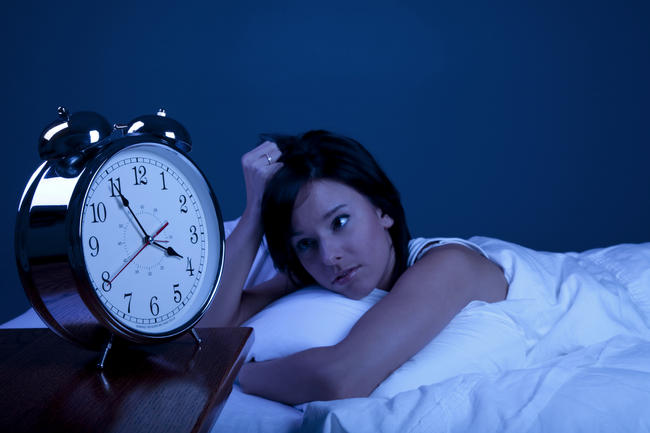A good night’s sleep makes a person refreshed and energetic in the morning. But not everyone gets the luxury of sleeping through the night. They face something known as insomnia which, in simple words, is a sleeping disorder. It is a condition in which individuals have difficulty getting a good night’s sleep. It either causes you to stay awake most of the nights, or sleeping for just a short while. Either way it leaves you drained, groggy and lethargic in the morning. Although most people go through a stage of insomnia at some point in their life, a continuous occurrence can be cause of concern, especially in young people. Like every other disorder, insomnia also has treatments. Listed below are a few facts and features about insomnia.
Symptoms:
1. Anxiety: This causes a person to worry about everything unnecessarily. It could be money related, personal matters, work related or even health related. They keep anticipating disaster all the time.
2. Not enough sleep: This is one of the most common symptoms of insomnia. You do not sleep during the night and in the morning you feel tired and weak, in turn making you perform or function badly during the day. Fatigue overcomes you, you are drowsy during the day and are prone to more accidents and failures.
3. Difficulty concentrating: You will not be able to keep your mind concentrated on any activity during the day. You will feel tired and irritable most of the time and your attention span would also decrease.
4. Trouble maintaining sleep: Short durations of sleep is another known symptom. You are easily awakened by the slightest noise or pain and then find it difficult to go back to sleep.
5. Depression: You will be in a depression mode most of the time which means being sad and gloomy. Emotional behavior is also a valid symptom.
Treatment:
1. Sleep Hygiene:
a. Make sure you exercise regularly, but not just before you go to bed.
b. Also, try and avoid naps during the day which can harm your night-time slumber.
c. Food intake is also to be controlled. Try not to have a heavy meal just hours before you go to sleep.
d. Also avoid alcohol, caffeine drinks or nicotine within 5 to 6 hours of hitting the sack.
e. Getting into a daily routine helps to an extent, which means going to bed at the same time every night and getting up at the same time in the morning .
f. If sleep evades you once you hit the bed, then try reading for some time, listen to music or do something that relaxes and soothes your mind. Comfortable mattresses and ambience helps. Draw curtains if you have issues with light pouring in, wear ear plugs to mute sounds and keep your room temperature at a decent level.
2. Medication:
If normal home remedies don’t help, then take the advice of your general physician who might in turn prescribe you sleeping tablets. They will give you immediate relief, but may not work for you in the long run and can even make you drowsy and lethargic the next day. Another issue with medication is that they can be addictive, making it less effective the more you take them.
3. Cognitive and behavioural treatments:
This aims at changing unhelpful behaviors and thoughts that may be the cause of your insomnia. Your doctor might ask you to take the help of treatments such as stimulus-control therapy, sleep restriction therapy, relaxation training and biofeedback which will tackle the sleep disorder issues in a prolonged but effective manner.
Prevention:
1. To prevent insomnia there are a few basic things you need to focus on. For example, if you know in advance you are travelling or are prone to jet lag, then adjust your sleep time a few days prior to it to get used to the timing.
2. Rest and relaxation is another core activity. Keep your mind free of problems and be stress especially when you are getting ready to sleep.
3. A good diet is also important to prevent insomnia.
Frequently Asked Questions:
Q. What are the two types of insomnia?
Primary insomnia is a sleep disorder caused usually by travel-related jet lag, work stress, shift in work timings and other stressful events. They usually come to an end once the issue is tackled. Secondary insomnia, on the other hand, has an underlying cause. It could be depression or anxiety, pains, gastro problems, menopause and so on. The underlying issue first needs to be solved in order to tackle the insomnia.
Q. Do more women have insomnia than men?
Studies have proven that women are more likely to have insomnia than men. A good enough reason is the hormonal changes that take place during menstrual cycles and then during menopause. During pregnancy, especially in the third trimester, sleep deprivation is persistent.




